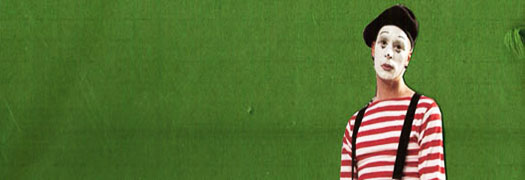
Features | Lists
By The Staff

40 :: Yo La Tengo
I Am Not Afraid of You And I Will Beat Your Ass
(Matador)
Blindsided. I “like like” but don’t “love” Yo La Tengo, and after their Is Murdering the Classics release earlier in the year I decided that I would not anticipate, in any way, their forthcoming release. For starters, I was getting into a funk; April had already seen the release of You In Reverse, an epic disappointment from one of my favorite bands. So I told myself that some bands have just been at it for too long, and I can’t depend on them anymore. It was a break-up with no hard feelings, after all; so long to the memories, the favorite songs, the mixtapes, the dreams. So long, old bands.
I Am Not Afraid of You and I Will Beat Your Ass makes that nostalgia a joke, both literally with the hilariously virulent title and implicitly with the searing 10-minute guitar-driven opener. Thus the Tengo waltzed back into my life in a major way. The opening song, “Pass the Hatchet, I Think I’m Goodkind” is an appropriately menacing “axe” number (and the most definitive opening track statement since the Fiery Furnaces’ “Quay Cur”). The passion of that song, and the way that it abruptly ends, suggests “we could do this all day,” though they have never been content to be static. This is no exception. They follow that song with a great horn and piano-pop number (“Beanbag Chair”), a beautiful ballad (“I Feel Like Going Home”), and a pop number even cheezier and more amazing than the first (“Mr. Tough”). The final third of the album drags, but that’s almost beside the point. As the album pushes past the 70-minute mark and attention wanes, the band continues flashing its chops, proving its continued mettle. Closer “The Story of Yo La Tango” returns the band to their strengths, as it were, making the threat real again one more time: ass beatings, YLT-style. Thanks, Yo La Tengo, I’m ready for another.
Craig Eley
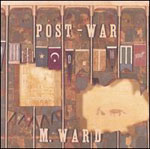
39 :: M. Ward
Post-War
(Merge)
From album to album, M. Ward’s music doesn’t change much. For once, this is a good thing. On the Portland-based artist’s fourth record, he sticks to what he does best—crafting simple, engaging folk songs entrenched in American roots tradition that keep the focus on his husky, endlessly-yearning voice. Ward’s signature lo-fi production is warm and animated. On many tracks you can hear the floor creak, cords tap against guitars and the hums and buzzes of various insects, and this just adds to the charm and authenticity of Ward’s old-time thing. Honest and unpretentious, Post-War reveals Ward as a hopeful romantic: “If love is a poison cup/ then drink it up.” Romantic he may be, but a murky undercurrent twitches through a few of the tracks, and this is what keeps things interesting. “Right in the Head”, with its eerie percussion and bad ass distorted guitar, sounds like it could provide the soundtrack to that film-noir scene where the bad guy gets away. Coherent and robust, Post-War is Ward’s best album yet.
Kate Steele

38 :: Beirut
Gulag Orkestar
(Ba Da Bing!)
Name another album conceived by someone aged nineteen at the time of its release. There are probably a few, but I’d bet some if not most of them are mired in tar pits of their own self-involvedness, or at least (in indie rock) have a disproportionate appreciation for the importance of getting one’s favorite sweater back from an ex-girlfriend. Now compare those efforts to Zach Condon’s Beirut, a European-influenced montage of less obvious instruments—mandolin, ukulele, accordion, hand percussion and that beautiful, emblematic sonority of a trumpet. Like the Elephant 6 stable before him, Condon is writing from a cosmopolitan place, for a generation less interested in the reward of the more photogenic language of posture and pose than in exploring the many histories of the world out there. The album’s not only interesting and impressive, it may also be more truthful and less selfish for its exploration. It’s rare to hear someone so young talk about broadening their perspective. It’s rarer still to have their experiences broaden your own.
Gulag Orkestar is an album influenced by Balkan brass bands and, far from as intolerably pretentious as that sounds, it’s actually wonderfully endearing, whimsical, and fundamental in its pop melodies and structures. (Oh, and he wrote and recorded the fucking thing by himself in his bedroom.) The elegiac shuffle of “Prenzlauerberg”, mix-tape favorite “Postcards from Italy”, and refined “Rhineland (Heartland)” represent a good number of things, not the least of which are a mind with maturity, a sense for good sounds, good dynamics and tempo as worth noticing in a young musician as a good eye is in a painter. And a voice most singers would swim the cold, deep moat of some forgotten European castle town to possess. It’s not unreasonable to say that in a few years’ time Condon will be doing more than channel Nick Cave and Rufus Wainwright. Gulag Orkestar is as rewarding for its promise as it is for its accomplishments.
Conrad Amenta

37 :: The Red Giants
The Red Giants
(Rip Smash)
Forget the line yoked by everybody from Wesley Snipes to Sandra Bullock; I want to finally mourn Rizzo the Rat’s poor cigarette. Like Jermiside, his lips were too loose to hold it (oral fixations are sinking ships; our emcee snarks that stopping his flow would require a damn). I curb this forty in memory of the flames—any band flirting with Midnight Cowboy is playing with fire, right? Especially slow-talking over the theme like you’re delivering a pick-up line (the Red Giants call it “Intro”; I say the whole album is trying to pick us up). Then again, all of the Rat’s “sweetest songs” were played and unplayed; he played everything, and that’s the crux of 2006’s underground hip-hop gem.
That sample that opens “Soundgazing” has your head bobbing before Jermiside has spat word one, before Brickbeats has set drum to anchor; before anything has really even happened, you’re prisoner to this old school vibe, your cell built from gorgeous soul cuts. Shiver to every filter creak, smart at every cut beat, helplessly try to take notes on Jermiside’s constantly fluctuating “Optimus illa-flow” meter-machine (no need to feed it quarters; he sure ain’t giving quarter to P. O. double-you). And just like the cowboy and his manager, this is beautiful synergy: Jermiside matches every horn or vocal sample Brickbeats can cram into fifty-odd minutes of throwback blister session bliss with some of the most engaging, astute grammar this year: “I say a rhyme trying to find my place in space and time / They say that the music that I’m making is a waste of time / But I’m gonna stay spitting; the type of shit to raise the mind / State of mind and keep forcing you to press play and rewind.”
Okay, fine: “Hey—he’s talking here!” It’s cool, ‘cause I want to hear him talk.
Mark Abraham

36 :: Hidden Cameras
AWOO
(Outside Music/Evil Evil/Rough Trade/Arts & Crafts)
My first full year with CMG, 2006 has been a great year for discovering new music. One of the bands I’m most pleased to have discovered is the Hidden Cameras. Sure, AWOO is not the first album Toronto’s Joel Gibb and his very large, ever-changing band (previous alumni include Final Fantasy’s Owen Pallett) have released, but it’s the first one I’ve heard. If you’ve yet to be exposed to The Hidden Cameras, brace yourself for an interesting journey: much deeper than their smack-crackle-pop surfaces, Gibb’s songs are infused with a focused passion and joy. Hand claps and triangle tings aplenty, propelled by simply-strummed electric guitar which ventures at moments towards galloping surf rock, most of the tracks are danceable, or at least highly head-bobbable. In the same way that the album’s accomplished, hi-fi sound is expanded through the addition of the more absurdist elements of production, it’s the juxtaposition of Gibb’s perplexing and thought-provoking lyrics and his earnest choir-boy delivery that compels. Buddy Holly meets Andy Kaufman? Something like that. Impossible comparisons aside, AWOO, just like its title, entertains.
Kate Steele
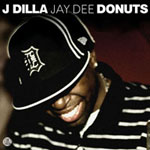
35 :: J Dilla
Donuts
(Stones Throw)
Already they spread. Like the titular snack, Dilla’s Donuts are best shared, and the late great one brought 31 treats for his fellows to sample. It’ll be fun in the coming few years to watch which emcees feel worthy to grab one. But these aren’t a three-day-old box of glazed round muffins picked up from the store; these are fucking wedding cakes, packed deep together, a baker showing off the breadth and invention of his craft. So the Roots took one glazed with wistful synths, sprinkled with phased-out vocal pulls, and wove it through an eight-minute statement of purpose, the best track on their best album. Oddball classic Fishscale took Jay’s suggestion, grabbed the slow-bake recipe tagged “One for Ghost” and spun it into a paean for maternal ass-whooping. What’s remarkable about these Donuts, though, isn’t just the pleasure to be gained from ingesting one, or from the anticipatory thrill of watching other chefs reuse the recipes; what’s remarkable is how well they’re taken in one sitting, how the diversity of color and shape coheres, glows, builds. This is, in other words, one delicious fucking album, with only a hint of unintended bitter to pull against the overwhelming sweetness of the music.
Clayton Purdom
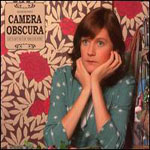
34 :: Camera Obscura
Let's Get Out of This Country
(Merge)
In a banner year for indie-pop, Camera Obscura stepped to the front of the line and demanded to be noticed. Let’s Get Out of This Country was the first time the Glasgow group recorded with a producer in a professional studio, and the result is a band revitalized. Borrowing some of Phil Spector’s shimmering orchestrations, songs such as “Hey Lloyd, I’m Ready to Be Heartbroken” and the unfairly exuberant title track find the band playing and singing with contagious enthusiasm. There’s not a bum track in the bunch; the faster tunes mesh nicely with the swooning ballads (“Country Mile,” “Dory Previn”) and mid-paced jaunts (the lovely finale “Razzle Dazzle Rose”). Okay, maybe do-nothing “The False Contender” is a little weak, but it’s easy to overlook when padded by two sides of such successful pop. Three albums in, Camera Obscura seems to have found its niche—maybe when the next one comes out, we can even talk about it without mentioning Belle & Sebastian.
David Greenwald
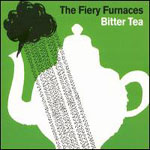
33 :: The Fiery Furnaces
Bitter Tea
(Fat Possum)
On LP #4 the Friedberger’s finally hit their stride. I never really understood the hype around Blueberry Boat, but with last year’s EP and now Bitter Tea, the band’s variety of eccentric pop has really started to click. And sure—lovers and haters will say I’m the one catching up, but the Furnaces have been evolving as well. The music is still goofy and absurdist, sure, but the band is more focused, more willing to pare down bizarre extraneous elements to the benefit of their pop core. There are still plenty of off-kilter keyboards, electronics bleeps and blops, and backward-run vocals, but more than on any of the band’s previous albums, these things actually serve the songs, rather than cling to them precociously. And when the band really pulls that cover of noise back to allow us to glimpse the straight-forward pop underneath, as on “Teach me Sweetheart” and “Waiting to Know You,” it’s pretty hard to question Matthew Friedberger’s songwriting prowess. It still takes a certain amount of patience and an open mind to get into the album, but anyone taking indie rock so seriously as to dislike a silly love song like “Police Sweater Blood Vow” is sort of missing the point.
Peter Hepburn
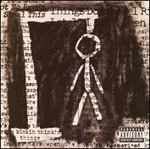
32 :: The Roots
Game Theory
(Def Jam)
?uestlove is almost Kevin Smith. The once-tubby-now-a-little-less-tubby, talented orchestrator pops up in so many blurbs and shameless publications that you wonder when he has time to practice his craft. Wait, which one am I talking about? Exactly. Both have opinions about other artists and various stories about their respective travails out their respective asses, and both are well-respected in their respective fields. There is one glaring difference, though, as evidenced this year in this little melancholy Youtube flick:
See, where director Smith revels in any opportunity to knock on his own failures (Mallrats, Jersey Girl, being a huge nerd) as well as others’ (Gigli) and practically sustains life off boxes of Cinnamon Toast Crunch and self deprecation, ?uestlove pours his heart out and is practically in tears at the thought of being stripped of his group’s “critically acclaimed” title (which will probably never happen, as long as they keep playing instruments and being black).
The Roots have been hip-hop sacred cows for years, but with Game Theory they give the divinity free-pass a pass, riskily explore new territory, and actually come out better on the other side of mortality. The album trades in the bouncy, signature Roots-esque sound for a more ominous, foreboding one—with no small thanks to Black Thought’s expressive and personal and human concern — the ground-level mood being jarred by spacey effects and futuristic guitars. This is their most left-field album, which is either ironic or appropriate, being that this is their first album on Def Jam Left or Def Jam Lofty or whatever Jay-Z wants to call the section on his label for artists who he knows beforehand won’t sell. Though sales were in fact quite dismal, true fans were calling the album a return to form after the lackluster Tipping Point. Oh, but that’s not good enough for ?uest. Oh no. He needs to make it on Mojo’s Top 50 in order for him to be satisfied with his year. Oh yes, the same Mojo’s Top 50 that put the Raconteurs at number one and the Arctic Monkeys at number three. Yeah…maybe it’s Black Thought’s rotation as media captain next year.
So take this cue from Mojo: Game Theory is “actually” good. And ?uestlove is a better drummer than Meg White or whoever drums for the Raconteurs. Plus, Malik B is back. Just in time, too, cause “crack is cool,” again. Oh, he’s off it? Figures.
Connor Morris

31 :: Perfect
Giddimani
(DHF)
Every self-loathing rap kid (the only kind) has that KRS/Shabba maxi-single stored away somewhere, or Buju’s “It Was a Good Day”-jackin’ remix of “Champion” or Mad Lion’s “Take It Easy” or that white Whitey Don 12” “Article” with Phife and Chip Fu or Tiger’s “Windscreen” feat. Q-Tip or Capleton’s “Wings of the Morning” (grabbing Slick Rick’s “Children’s Story”) or the Special Ed remix of “Slam” or pretty much anything by Supercat, especially his appearance on the “Jump” remix (yes, that “Jump,” no fear, no shame).
On Giddimani Perfect burns all of those Jamaican-American bridges to build new ones. You’ve seen Mr Lif or Lateef live and you know how much a ragga-bounce in a rapper’s delivery can increase the sheer fun and wit and buoyancy of any given performance, can turn a head nod into a grin and head nod as a melodic, breathless sing-song element is peppered dead-on-beat to a rapped verse, that lost art that Dose-One is now turning into alchemy. Perfect chats and sings with the enthusiasm that made every debut Heiro record a time-capsule of distilled excitement. Yes, I did in fact write, “Perfect chats and sings with the enthusiasm that made every debut Heiro record a time-capsule of distilled excitement.” He sings about Jamaica-US relations on various levels, and is capable of turning a seductive party-jam (“Hand Cart Bwoy”) into an ode to the powers of the simple life, all by contrast to whatever we do here in North America, and all simply by virtue of his smart track listing. And while “Hand Cart Bwoy” will likely go down as one of his best-ever songs, see “Market Place” for the figurehead lines: “I’ve never seen an airplane crash in a building around here / in Jamaica you should have no fear… / so don’t be afraid / if you should hear a lickle one shot burst / the gangsters are playing / but in Iraq it is worse.” Perfect’s writing is remarkable for the way it channels global politics through a foreign local perspective. Perfect’s delivery is remarkable for the way he savours every single word that crosses his tongue (see “8 Gangsters”). His melodies are gorgeous, his energy infectious (“Hit Dem”), and even his back-up vocalists would steal the show if he weren’t such a tight-wound packet of smarts and charisma, an insurmountable obstacle. If you were a sucker for the pure energy in any of the above-listed records, this album is your floodgates to a new crop of Jamaican music that operates on its own terms. Which is essential, since most contemporary rap would melt in this light, anyway.





